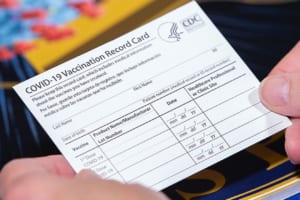We have previously written about what lawful permanent residents can do if their Form I-551 “Green Card” has been lost, stolen, or destroyed and they are outside of the United States. In these articles, we have mentioned obtaining a travel letter or ‘Boarding Foil,” so they may return to the United States. One of our regular readers recently asked: “What is a transportation letter or boarding foil?”
If your Green Card is lost, stolen, or destroyed, you can only obtain a replacement from the United States Citizenship and Immigration Services (“USCIS”) in the United States. A U.S. Embassy or Consulate abroad cannot issue a replacement Green Card. Therefore, if you no longer have your Green Card to reenter the U.S., you may need to apply for a travel document using the Form I-131A Application for a Travel Document.
Upon approval of the application, the U.S. Embassy or Consulate will issue you a travel document that will allow you to board the airline to return to the United States. The travel document is called a variety of names, such as a Boarding Foil, Transportation Letter, Transportation Boarding Letter, etc. Generally, these are issued in two forms.
A Transportation Letter is just like it sounds; an official letter issued by a U.S. Consulate that will allow you to board the airline to return to the United States.
A Boarding Foil is sometimes an actual visa that is affixed into your passport. It looks like other U.S. visas. The term “foil” is a holdover term from when U.S. visas had a texture that was similar to foil (e.g, aluminum foil).
What else you should know about a Transportation Letter/Boarding Foil:
- To be issued a Boarding Foil, the Immigrant Visa unit of a U.S. Consulate must interview you and confirm you have maintained permanent resident status.
- They are usually issued within a few days.
- They are usually valid for only 30 days and for a single entry.
- Boarding Foils may be issued only to permanent residents who are returning to the United States after an absence of less than one year.
- If your Green Card had a 10-year validity but has expired, you might not need a Boarding Foil. An airline may board you with the expired card, providing you meet all their other conditions for travel. However, if you have been outside the U.S. for over one year, you may be questioned at the port of entry. We advise you seek legal advice before traveling.
- Conditional Permanent Residents who have an expired Green Card with a 2-year expiration date and a Form I-797, Notice of Action, showing that they have filed a Form I-751 or Form I-829 to remove the conditions on their permanent resident status should also be able to apply for a Boarding Foil.
- The Boarding Foil does not guarantee entry into the United States. The Department of Homeland Security is the final authority for entry. It only exempts an airline from fines and penalties of boarding an undocumented person flying to the United States.
If you have any questions or concerns about immigrant matters, please contact us at info@enterlinepartners.com and speak with a U.S. immigration attorney based in Ho Chi Minh City, Manila and Taipei.
ENTERLINE & PARTNERS CONSULTING
Ho Chi Minh City, Vietnam Office
Suite 601, 6th Floor, Saigon Tower
29 Le Duan Street
Ben Nghe Ward, District 1
Ho Chi Minh City, Vietnam
Tel: +84 933 301 488
Email: info@enterlinepartners.com
Facebook: Enterline & Partners – Dịch vụ Thị thực và Định cư Hoa Kỳ
Website: http://enterlinepartners.com
Manila, Philippines Office
Tel: +632 5310 1491
Email: info@enterlinepartners.com
Facebook: Enterline and Partners Philippines
Website: https://enterlinepartners.com/language/en/welcome/
Copyright 2021. This article is for information purposes only and does not constitute legal advice. This article may be changed with or without notice. The opinions expressed in this article are those of Enterline and Partners only.








